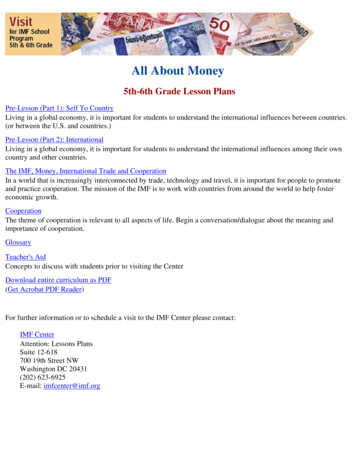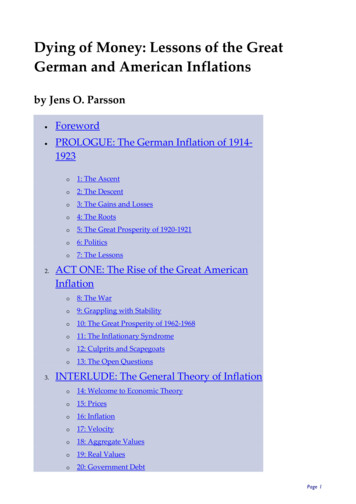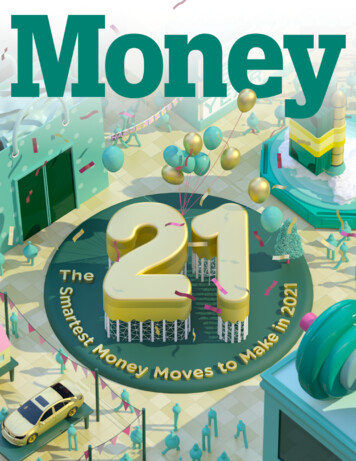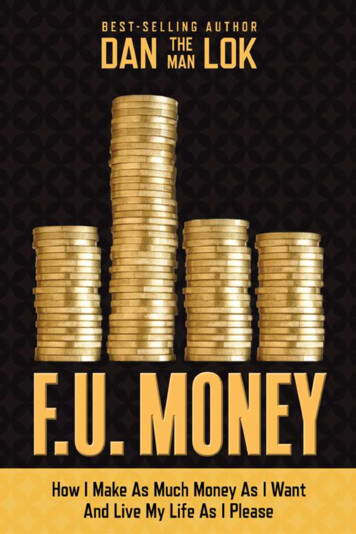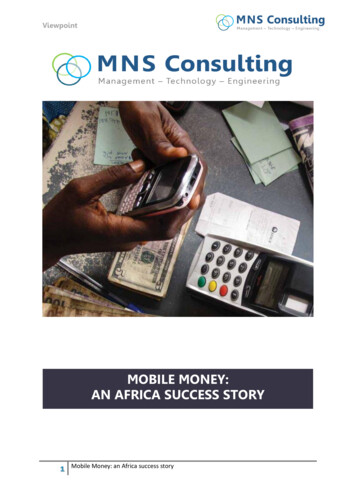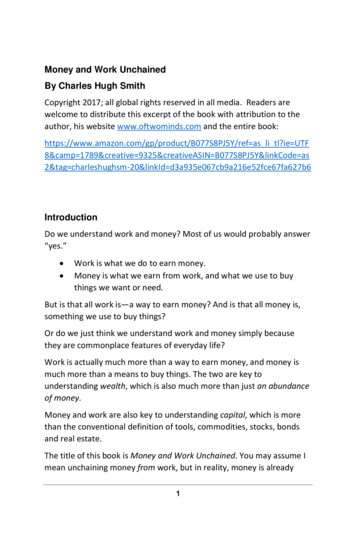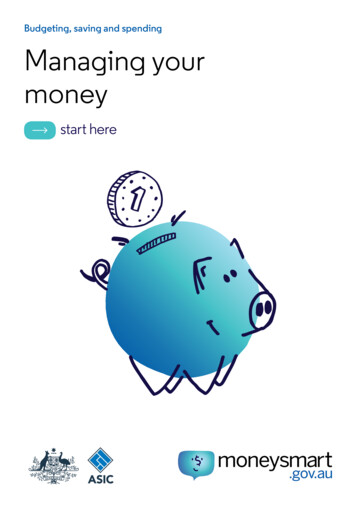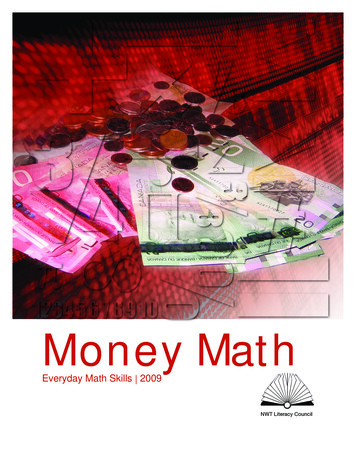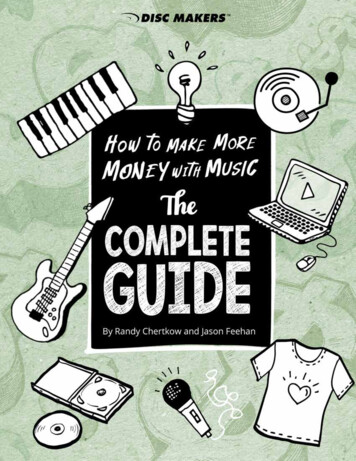
Transcription
1
HOW TO MAKE MORE MONEY WITH MUSICThe Complete GuideBy Randy Chertkow and Jason Feehanpresented by tIntroduction:Making Money From The Studio To The Stage.3Part 1:Making More Money With Your Studio. 4Part 2:Generating Revenue By Licensing Your Music.8Part 3:Merch Strategies To Build Your Brand And Earn More Revenue. 18Part 4:Making More Money From Your Shows And Stage. 26Part 5:Nine Free Revenue Streams For The Working Musician.30Making Money With Music. 37About The Authors. 382
Introduction:Making Money From The StudioTo The StageAs musicians and artists, our passion is to makeyou’re reading come in. We’re here to help showmusic to express ourselves, entertain our audi-you what’s possible, what services to use (manyence, and build connections with our fans. Butof which are free), and most importantly, how toonce the music is created and released into thetap — and boost — the revenue streams withinworld, how do you build and sustain a music ca-your reach. Read on for revenue-generating tech-reer? It seems no two artists build their careersniques involving everything from studio to stage,the same way, but there are money-making andincluding licensing, merch sales, artist branding,business-building techniques that every musi-building a following, and more.cian can access. The question is, which you willchoose to master and implement in your ownShare this guide with your team and other art-music business?ists you know so you can discuss which revenuestreams, methods, and techniques work for youIn researching our book, Making Money Withand brainstorm which new ideas you want to try.Music, we identified over 300 sources of incomeAfter all, business is a team sport. As the sayingfor musicians. The book documents the frame-goes: if you want to go fast, go alone; if you wantworks, patterns, and recipes you can follow toto go far, go together. There’s more income to behelp you grow your music career, many of whichmade for your music business—the techniquesyou can simply add to what’s already working forinside this guide will help you unlock it.you. For example, if you’re in your studio recording music, there are other musicians who mightPrefer video?be interested in buying the by-products of yourWe’ve created videos for each section of thisrecordings, such as the stems and raw tracks andguide. Click here to watch them all or check outeven your unique presets or original samples. Ifthe individual videos from each section.you perform live, there are revenue streams before, during, and after every show you could betapping. Most musicians miss these opportunities because they don’t know about them orknow how to implement them.That’s where our book, free newsletter, dozens of Disc Makers Blog posts, and this guide3
Part 1: Making More MoneyWith Your StudioClick here to watch the videoThink about all the work that goes into record-1. Create multiple products and revenueing a song. There are a ton of components thatstreams from one trackmake up the final track. For example, a singleYour final track is not one product—it is actuallysong might have dozens of individual instru-many products and each can earn you royaltiesment tracks, tweaked virtual synth sounds andindividually. This generates multiple revenueeffect chains, original beats, and even originalstreams. You can:samples you create specifically for the song.Sell and stream your music via digital disAll of these components come together to cre-tribution. The place to start is with digital dis-ate your final mix, but they are invisible to yourtributors like CD Baby to release your musicfans. Once you master and distribute the finalworldwide. This is the key first step since it’s thetracks to distribution platforms, you can thenprimary way your fans can stream, buy, and en-make money from your sales, streaming, andjoy your music across multiple platforms.royalties if you’ve registered them properly.Collect royalties when your music is perBut there are dozens of potential revenueformed or streamed. There are dozens of roy-streams hidden in that track you created.alty revenue streams you should be earning.Unlike other industries, music is unique when itThere’s too much to go through in this guide,comes to making money: almost all aspects ofbut they are covered in detail in our book,the production process can be sold or licensedMaking Money With Music, which includesto open up new sources of revenue for your busi-details for how to register with Performanceness. But, to unlock these streams, you need toRights Organizations (PRO) like ASCAP, BMI,pull out these items and make them available.SEASAC, and SoundExchange. You can also usea service like CD Baby Pro Publishing, whichWe’ve broken this down to three things:will help you collect many of your royalties fora percentage cut.1. Create multiple products and revenue streamsBy registering your music with PROs, you canfrom one trackget paid for all the hard work you put into get-2. Sell and license your track’s by-productsting your track streamed, played on the radio3. Monetize your production process(Internet or terrestrial), and performed. Once4
registered, these royalty organizations—whichvices like Disc Makers. Don’t just focus onvary in how they operate and collect perfor-your one track or album. Consider special ormance/mechanical royalties when your music islimited-editionplayed—will begin sending you checks. For somehits, genre themed albums, etc.), and more.versions,bundles(greatestorganizations, if you give them permission tocollect worldwide royalties, you can start gettingLicensing your music. You can also licensechecks from plays worldwide. Don’t discount theyour song and sound recording to business-international nature of this—it’s surprising howes such as media companies, film studios, ad-often music gets popular in different corners ofvertisers, TV production companies, and more.the world even if you haven’t toured there.These are not only a parallel revenue streams,these are entirely different target customers. WhileSelling alternate versions of your music. If athe best deals usually come from personal re-song becomes popular, you can sell alternatelationships with music supervisors, you canversions of the track—sometimes at a pre-use CD Baby’s Music Licensing Platform ormium. This includes remixes, demo versions,put your music up on licensing libraries suchlive versions, making-of, and various otheras Songtradr or Music Supervisor. (We go intospin-offs. Besides selling these, you can alsodetail about licensing in Part 2 of this guide.)use them as crowdfunding or patronage re2. Selling and licensing your track’swards to get more income from your backers.by-productsSelling hi-def/high-quality digital versions.You know the sounds and presets you use inSome of your audiophile fans will want hi-defyour music? Your musician fans may want those.or high-quality versions of your music, and youProduction elements such as your stems, beats,shouldn’t disappoint them. You can make WAV,and source tracks can be used by your fans andFLAC, or lossless tracks available using digitalremixers to use in their own music. A very pop-storefronts like Shopify, SquareSpace, Pay-ular song with a unique sound gives you theloadz, or any other digital distribution platforms.opportunity to let your musician fans pay to getaccess to your music’s individual elements andSelling physical product. Physical productsopens up entirely new sources of income such as:can make you the most margin—significantlymore than digital sales and streaming alone.StemsWhen you’re performing a show or holding ansource tracks are ready-made for remixersevent, it’s the easiest way for fans to get yourwho love your song and want to make theirmusic and you can capture impulse buys. Con-own version or remix it. When you licensesider creating products like USBs, CDs, vinylthese, be careful not to give away too manyLPs, and more from manufacturers and ser-rights and lose the value in your own music.5andsourcestracks.Stemsand
Beats. There are some musicians who makeyou to provide some of these individual com-their entire living making beats and oth-ponents along with the full version of yourers who just do vocals on top of other peo-song to use in their work. Movie trailer andple’s beats. If you have a knack for this, cre-advertising music supervisors are specifical-ating them can be a full-time job. If you’vely looking for quick sound bites which evokeproduced beats for songs you’ve released, youemotions and you should have these ready-can license them and earn additional income.to-go to improve your chances to get licensed.Samples and sounds. Not every musician hasYou can sell your track’s by-products throughthe ability to capture high-quality sounds, and ifmarketplaces like Splice, Beatport, Beat-you have this studio capability, it can be a valu-stars, and Airbit. These curated sites are pickyable by-product from your recording process.about who they let in, so you may opt to sellFor example, some musicians capture samplesthem yourself using digital download sites likefrom every live drum set they record in orderShopify, SquareSpace, or Payloadz direct-to create virtual drum kits. And if you use yourly from your website. Be sure to share whatimagination, nearly every sound you captureyou’re selling on social media and spell outwhen recording a song can be used in sampleswhat you have available. And, you can do thisyou provide for licensing purposes. Note thatwhile still getting your regular music fans ex-sounds are useful for more than music: theycited about the new tracks you’re creating.are also licensable as sound design snippets forvideos, television, and movies. Because of this,3. Creating multiple revenue streams frombreaking glass can be just as useful as the vo-your music production processcal that can be sliced into interesting sounds.You can even make money from the songwritingand recording processes by creating videos orSynth presets, effects, and effect chains.live streams while you’re in the studio. Plus, it’sToday’s studio tools are very configurable andfree to stream a live video feed using servicescapable of creating a vast array of sounds andsuch as Twitch, YouTube Live, Periscope, Face-effects—especially if you chain them together.book Live, Mixer, and YouNow. And video sitesYou might have a knack for tweaking your synthsuch as YouTube, Vimeo, Facebook and othersor you may have found ways to tune your set-allow you to freely create an account and uploadtings just the right way in your latest release.your videos to distribute worldwide. Even bet-All of these can be saved and then purchasedter, all of these platforms have monetization op-by musicians wanting to do the same thing.tions which you will want to take advantage of.Licensing your by-products. When licens-Creating behind-the-scenes live streams or vid-ing your music, music supervisors may wanteos can enhance interest in your music and6
creative process. Even if you don’t play live,Conclusionthere’s nothing stopping you from streamingThere’s money in your music creation pro-or uploading a studio performance to open upcess! Stop thinking only about the final tracknew revenue streams, especially if you haveyou release, start taking advantage of thesea dedicated or sizable following. And don’telements during the recording process, andforget, these extras can make patronage oryou can make more income off the samecrowdfunding rewards that can be the per-track. If you are aware of all these revenuefect bait to entice people to become backers.streams in the studio, you can run your recording process with this future income in mind.Of course, whenever you start making diaandboosttorecordinginterestannouncePro Tip!byyou’resharing aspects of the production process.For more about making your videos andvideo streams sound and look the best, read“Improving the audio in your streamingbroadcasts and videos” and “Easy fixes toimprove the lighting in your videos”on the Disc Makers Blog.7
Part 2: Generating RevenueBy Licensing Your MusicClick here to watch the videoGetting your music licensed is a fantastic waywork: you can’t say no if someone wants to cov-to boost your income and get exposure, and to-er your song and there’s a maximum amountday’s independent musicians are scoring moreyou can charge. But the law doesn’t regulatelicensing deals for film, TV, movie trailers, andthe rates when someone wants to use yourcommercials than ever. To help generate thesemusic in an audio-visual work like a televi-opportunities, you need to understand how li-sion show or film. In fact, you can refuse tocensing works; learn how music is chosen for TVlet them use your music or set any price you’dshows, movies, and other audio-visual works;like. If they don’t pay for it, they can’t use it.and get your music in front of the right people.This kind of licensing deal is known as a syn1. What licensing ischronization (sync) license, because the li-When other people want to use your song/cense allows that person or production com-composition or sound recording for their au-pany to sync your sound recording to visualdio-visual work, they need to ask your permis-images. In other words, you’re not selling it—sion and obtain a license from you to do it.they’re renting it and can only use it for whatMost artists are familiar with how cover songsyou allow them to do with it in the license.WHAT IS AN AUDIO-VISUAL WORK?EXAMPLES OF WORKSThe term “audio-visual work” is legalese for aFilmsvisual presentation that includes sound, re-TV showsMusic supervisorsgardless of the technology used (projectors,VlogsFilm or TV productionscomputer, etc.). Whenever someone wantsDocumentariesFilm Or TV directorsMovie trailersYouTube creatorsto incorporate your song or sound record-YouTube videosing into their audio-visual work, they have toWeb seriesget your permission. Part of granting yourShort filmspermission is charging a license fee for itsCommercials and adsuse. At right is a list of uses that may triggerRadio spotsAppsa license as well as a list of people who typ-Video gamesically contact musicians to use their music.8PEOPLE WHO MAYCONTACT YOUIndie filmmakersStudent filmmakersAdvertising companiesStudiosApp developersVideo game creators
Since there’s no limit set for what you can exactly how they can use your musiccharge for sync licenses, you can ask for as how long they can use itmuch money as you want. Realistically, what where they can use it (geography/country)you can get is determined by the market and how much it will cost them (the license fee)the budget the interested party has to work how they should credit the songwith. But you have another advantage: if you w hether others can license and use thisown both the song/composition and the soundsong or if they are the only ones exclusivelyrecording, then you can get two license fees be-licensing itcause audio-visual works need to license both! any other terms and limitations you canmutually agree toFor example, when our band, Beatnik Turtle, licensed one of our songs to ABC Family/What licensors will ask for is typically broad,Disney for use in a nationwide television ad-but it’s in your interest to make the license asvertisingcampaign,werestrictive as possible andnegotiated two licenses:Pro Tip!one for the right to syncuse our master sound recording. Since we ownedall the rights and acted asour own publisher (song/composition) and musiclabel (sound recording),we ended up receivingall the money. Of course,pect of the license so youcan negotiate a fair sync fee.our song/composition andanother for the right tomake them pay for each as-Make sure you capture all themoney you can from licensing.Read our book, Making MoneyWith Music, which explains“The 12 Registrations You ShouldDo For Every Compositionand Sound Recording To EnsureYou’re Paid What You’re Owed.”And remember, when the audio-visual work airs, it will generate performance royalties.Plus, the exposure and publicity the audio-visual work generates can boost merch sales,ticket sales, word-of-mouthbuzz, and streams of your music. Of course, you can only getthe makers of the audio-visual work could have hired musiciansthe royalties if you register your music with a Per-to record a cover version of our song toformance Rights Organization in the first place.avoid paying the sound recording sync liFor all these reasons, getting a licensing dealcense, but they wanted our original recording.can be lucrative. To improve your chances ofBut it’s not just about the sync fee. Asgetting your music licensed, you need to under-the copyright owner of your song/com-stand who the key people are when it comes topositionyou’replacing music in film, TV, ads, and movie trail-free to negotiate all the terms, including:ers and give them what they’re looking for.andsoundrecording,9
2. Understanding music supervisors’ needsnon-musical directions like, “I want a song that’sDirectors and producers hire music supervisorsblue” or “It needs to sound like an autumn dayto find the perfect music for the story beingsmells.” Once the ideal music is found, music su-told. These music supervisors are also respon-pervisors jump into negotiation mode and try tosible for securing the music rights and work-contact the musician, publisher, or owner to se-ing out the licensing deal. Their jobs mix theircure the rights and work out a deal that fits theirlove of music with a knowledge of filmmak-budget. Despite their expertise, even if they finding, copyright law, and contract negotiation.what they feel is the perfect track, anyone on theproduction team can veto their choice, even theMusic supervisors live and breathe music. Theseactors. With advertising, the paying client alwaysare the people who are constantly on the look-has the final say. Because of this, music supervi-out for new music and new genres, scouringsors keep multiple music options at-the-ready.music streaming services for new sounds. Theyfrequent music blogs and podcasts and keepSince every medium has specific needs, music su-up on music news and websites. Their deeppervisors often specialize in television, film, com-knowledge of music is critical since it helpsmercials/advertising, or movie trailers. Here arethem create a mood, elicit a particular emotion,the needs of each of these areas so you can an-or build pace within a scene. As a result, theygle your music towards what they’re looking for.have huge, carefully cataloged music collections and stems so they can locate the perfectFilmpieces when they need something right away.Films have historically been popular targets for musicians since getting placed in aBeyond recorded music, music supervisors alsofilm can be extremely lucrative, especiallyhave trusted musicians they work with who canfrom performance royalties. Films take lon-create music on demand. They know they canger to create than TV shows or movie trailers,call on these musician/composers at any timewhich provides more time to find that per-to come up with the right music for their scene.fect song and clear the rights for the music.These musicians have shown they can meet tightdeadlines, often writing and recording music inWhen it comes to film scores, movie studios of-a weekend or even a matter of hours. These keyten follow a different process. They may hire amusician partners thrive in creating music at a mo-composer or musician to create the score (alsoment’s notice and can sign over the rights quickly.known as commissioning a score). That said,depending on the film, they may license exist-Music supervisors have to deal with very de-ing songs for scenes, depending on the direc-manding clients—directors, editors, musicians,tor’s needs. For example, “Stuck in the Middle”and publishers—who may give them vague,in the film Reservoir Dogs or “Starman” in The10
Martian. Note that instrumental versions ofsupervisors need snippets of music to createsongs are just as useful as the vocal versionsimpactful moments. As Exum explains, “Trail-since directors and music supervisors some-ers follow a three-act structure: an opening, atimes need background music during scenes.middle, and then a big payoff at the end. Eachact needs different music.” To do this, musicMajor film studios typically have a dedicated mu-supervisors want your song stems along withsic budget, along with a licensing and accountingthe final track. That way they can blend andprocess, to license music, so if you’re contactedslice the music around the needs of the trailer.by one, things can go relatively smoothly. Independent films and filmmakers, unfortunately,Televisionoften lack all the above. And, since they mayThere’s more TV being made now than everlack the budget, they typically offer musiciansbefore thanks to streaming, cable, broadcast,a “step-deal,” paying out license fees based onand the innumerable other delivery methodsthe actual box office receipts. Even if you ne-available. Like movie trailers, television re-gotiate such a deal, know that since indepen-quires quick turnaround times. Shows can bedent studios often lack the bookkeeping capa-produced within a week, which not only keepsbilities and staff, it may be more of a challengetelevision music supervisors extremely busy,to get your fee paid even if the film “makes it.”it also opens up a lot of opportunities for musicians. That said, music budgets for televi-Movie trailerssion are smaller than for major film studios.In the past, movie trailers were only seen beforeAs a result, television music supervisors live inmovies or on TV as 30-second commercials. To-a fast-paced world and musicians who workday, trailers are available on the Internet and arewith them need to be responsive and flexible.often two to three minutes long. As Danny Exum,a movie trailer music supervisor, told us: “Trail-Music requirements for television depend on theers are big business, getting as much as 100 mil-show’s style, setting, and time period—and whatlion views online, and there are never enoughthe individual scene calls for. Similar to films,fresh songs out there to use.” Movie trailerssome studios commission scores for their televi-usually don’t use the film soundtrack (since it’ssion series, but there are plenty of scenes wherebeing created at the time the trailer is being putexisting songs set the right mood. Although hav-together), so this makes it another licensing op-ing your stems available is a good idea, they’llportunity for you to target. You don’t have to getbe more likely to just use the finished tracks.your song placed in the film to be in the trailer.Commercials and advertisingTrailers need to generate the right emotionsHistorically, many musicians were uncom-in a short amount of time. To do this, musicfortable licensing their music for advertising,11
but today, ads and commercials are seenfor your music is exactly what they’re lookingas great opportunities for exposure and in-for to promote their brand to fresh audiences.come. The Black Keys, for instance, have licensed many of their songs for televisionCommercials, like movie trailers, have preciseand commercials, generating significant rev-timing requirements. For this reason, many mu-enue while boosting awareness of the band.sic supervisors turn to trusted music productionhouses to compose custom music. If they use anAdvertising music supervisors who work withexisting song, they’ll want both the instrumentalmusicians usually do so to target that artist’s au-version as well as the stems. This allows them todience. They’re often hyper-interested in yourmaneuver around the lyrics, since a lyric sung atdemographics, such as age, gender, and location.the wrong time might conflict with the narrator’sBy using your music, they hope to associate theirvoice-over. Or, they may want to cut out certainproduct with the same vibe that energizes yourinstruments and bring the lyrics down duringaudience. Being new on the scene can be helpfulthe voice-over and then up again at the end.since the buzz you’re already trying to generatePro Tip!Don’t take it personally if music supervisors don’t use your musicMusic supervisors are extremely busy people who are constantly under tight deadlines andpressure. Their job is to find the perfect track to license for a specific scene. If a music supervisor chooses not to use your music, it is not a criticism, it only means the song didn’t fittheir specific needs for that project. Understanding this key difference can help you avoidtaking anything personally.MusicSupervisor.com has placed tens of thousands of tracks for its musician clients infilm, TV, and ads. Barry Coffing, the company’s CEO, says it’s usually not your radio-track,#1 live-show hit song, or favorite piece that gets placed. In fact, musician clients are oftensurprised that it’s a “filler” song or one of their overlooked tracks that scores the placement.This means the reciprocal is also true: the song or sound recording you place doesn’t meanit’s your greatest track, it simply means it fit the needs of the scene.12
3. Boosting your chances to license: keyroyalty-free. And, if you’re in a band, make sure tosteps to takecover all the intellectual property you create with-To help boost your chances of getting your mu-in your band agreement. Never use cover songssic licensed, follow these steps:for licensing—unless specifically requested andthe proper permissions have been obtained—Clear the rights to all your music. All poten-since you don’t own the rights to those songs.tial licensors, including music supervisors, wantto deal with songwriters and composers whoMake it clear you own “200 percent” of theown all the copyrights to their music. Theycopyright. When you say you own 200 percentwant to sign one agreement and avoid any legalof the rights, it means you can act on behalf ofquestions of who owns what. This means thatthe songwriter for the song/composition rightseven if your music is the perfect piece for theirand the sound owner for the sound recordingproject, they’ll skip it and go with “Plan B” ifrights. As mentioned earlier, the biggest night-there’s any hint of risk concerning copyright.mare for any potential music licensor is if thereare any snags with the rights after releasingMake sure you own or have cleared all the rightstheir work. If they want your music, they wantand can prove it. That means if you use loops orit free and clear. When you can prove you ownsamples, you have proof of permission to useall of the rights, they can do business with youthem in your sound recording or can prove they’remuch more easily.Pro Tip!Use split sheets to keep track of your rights and who owns whatSongwriting and sound recording split sheets are easy-to-use, templated agreements thathelp get everyone who is writing and recording music on the same page. These forms trackwho created what in a song or sound recording and document, in writing, the percentage ofincome owed to each collaborator. By using split sheets, you make it easier to register yoursongs and sound recordings for royalties while also protecting yourself against potentiallegal disputes should the song or sound recording take off or get licensed.The best time to capture this information is during or shortly after your songwriting or recording session. Capture this information early and make it a habit in your production process. We created free split sheets you can download, review, and use.13
Create a place where interested parties canis especially true for movie trailers. Using yourlearn about and hear your music. Licensorsmixing session to create these specialized ver-and music supervisors are looking for the ide-sions will allow you to have them ready at a mo-al piece of music to fit a specific clip of video.ment’s notice since licensors often don’t haveBecause of this, they focus on certain qualitiesmuch time when they decide to use a piece. Youof a piece of music, such as the overall moodshould also provide 320kbps MP3s and be surethe piece evokes, the genre, the tempo/BPM,to fill out all your ID3 metadata fields, includingwhether it’s an instrumental or vocal piece, andyour website and contact info.even what other artists it sounds like. Any descriptive info you can provide in advance aboutAlways be easy to contact. Make it easy forthese qualities makes a licensor’s job easier andanyone to get in touch with you by adding yourcould improve your odds of placement. List thiscontact info to any MP3s you send to potential li-descriptive info on a dedicated “licensing page”censors and music supervisors. Also, your emailon your website or post it to one or more ofsignature should include all your contact info,the various licensing services available. Havingweb addresses, and social media profiles so it’ssong/music descriptions at-the-ready will helpconvenient to find you. When someone needs ayou when it comes to categorizing your music.song, they usually need it immediately, and youdon’t want to miss out on licensing income be-Have mastered tracks of WAVs, stems, andcause they can’t connect with you.instrumental mixes for all of your music. Depending on the needs of the scene or video, theOnce you have the above, make it known thatperson or production company licensing youryour music is open for licensing and get it in frontmusic may need to use an alternate mix or justof key licensors, like music supervisors. This isone of your sound recording’s stems. Dependingdone through networking and making personalon how focused you are on licensi
3. Creating multiple revenue streams from your music production process You can even make money from the songwriting and recording processes by creating videos or live streams while you’re in the studio. Plus, it’s free to stream a live video feed using services such as Twitch, YouTube Li
